Related Topics
The Park and Beyond: East Falls, Germantown, Mt. Airy and Chestnut Hill
Fairmount Park is large enough to split the City from its suburbs, and is partly a playground, partly a museum. East Falls, Germantown and Chestnut Hill are almost a separate world on the far side of the park.
The British Attack Philadelphia
Fighting in the Revolutionary War lasted eight years; for two years (June 1776 to June 1778) Philadelphia was the main military objective of the British.
Historical Preservation
The 20% federal tax credit for historic preservation is said to have been the special pet of Senator Lugar of Indiana. Much of the recent transformation of Philadelphia's downtown is attributed to this incentive.
Revolutionary Philadelphia's Loyalists
History is written by the victors, so the Tory Loyalists of Revolutionary Philadelphia have mostly fallen from view.
Architecture in Philadelphia
Originating in a limitless forest, wooden structures became a "Red City" of brick after a few fires. Then a succession of gifted architects shaped the city as Greek Revival, then French. Modern architecture now responds as much to population sociology as artistic genius. Take a look at the current "green building" movement.
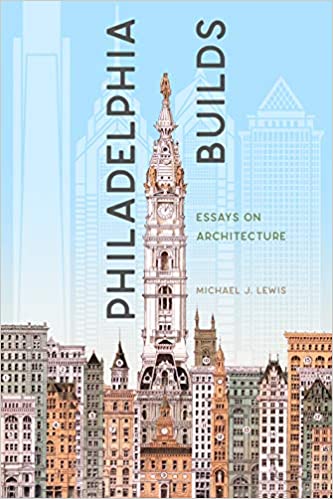
Dislocations: Financial and Fundamental
The crash of 2007 was more than a bank panic. Thirty years of excessive borrowing had reached a point where something was certain to topple it. Alan Greenspan deplored "irrational exuberance" in 1996, but only in 2007 did everybody try to get out the door at the same time. The crash announced the switch to deleveraging, it did not cause it.
Robert Morris: Think Big
Robert Morris wasn't born rich, or especially poor, but he was probably illegitimate. He had no recollection of his mother; his father, a tobacco trader in England, emigrated to Maryland and died rather young. It didn't take long for young Robert to become one of the richest men in America.
Right Angle Club: 2013
Reflections about the 91st year of the Club's existence. Delivered for the annual President's dinner at The Philadelphia Club, January 17, 2014.
George Ross Fisher, scribe.
City Hall to Chestnut Hill
There are lots of ways to go from City Hall to Chestnut Hill, including the train from Suburban Station, or from 11th and Market. This tour imagines your driving your car out the Ben Franklin Parkway to Kelly Drive, and then up the Wissahickon.
Peggy Shippen and Benedict Arnold: Fallen Idols
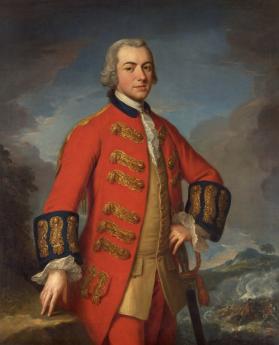
|
| General Burgoyne |
After defeating Washington's troops at the battle of Germantown, the British then occupied Philadelphia for the better part of a year. The town was a mess, with food shortages typical of the squalor of any occupying army equalling the existing population. Washington was forced to fall back to the natural fortress of Valley Forge. The city of Philadelphia was not exactly under siege, but it was as difficult a place for British troops to live as a besieged city. For his part, Washington was forced to shiver and starve in the nearby mountain valley, at least consoled by distant news of American achievements. General Burgoyne and his army were soon captured at Saratoga by General Gates under humiliating circumstances. Clearly, the dashing hero of this event had been Benedict Arnold on a white horse leading the charge, getting wounded in the leg in the process.
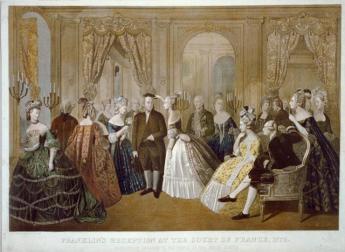
|
| Benjamin Franklin in Paris |
Benjamin Franklin in Paris trumpeted the news of this victory, reminding the French of Washington's earlier victory at Trenton, and maneuvering it all into a treaty of alliance. With the French fleet in the nearby Caribbean, Philadelphia was no longer a safe place for the British to stay a hundred miles upriver, and the idea of abandoning occupied Philadelphia began to grow. Having gambled on British victory in defiance of London's orders, the Howe brothers were not in a position to argue with new orders. The British soldiers inside the city were more comfortably housed than the American troops outside it, but nobody was exactly comfortable. The American Congress had, of course, fled to the hinterlands. All in all, it suddenly became uncertain who was going to win this war.
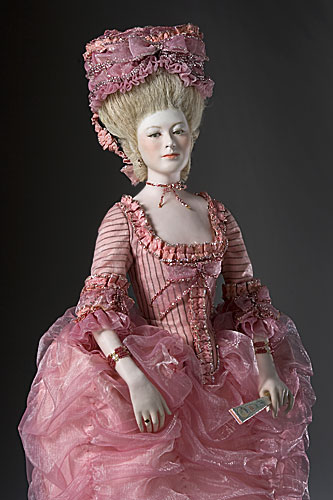
|
| Peggy Shippen |
The American population at this time has been described as a one-third rebel, one-third Tory, and one-third trying to hunker down to see who would win. Many of the seriously committed Tories had fled from Philadelphia when the rebels took charge, while pacifist Quakers were a little hard to classify. Generally speaking, the prosperous merchant class had never been persuaded King George was all that bad, while the less prosperous artisans were the fervent patriots. Under such conditions, many people who privately leaned in either direction found it was best to seem non-committal. The British were billeted in private homes; the Officers in the best houses of the merchant class, the common soldiers generally housed in the homes of the artisans. Although the soldiers and the artisans did not mix very well, circumstances permitted the aristocratic officers getting on pretty well with the merchants whose houses they occupied. The girls in the colonial families seemed immediately attractive to the British officers, who were far from home, while the officers also seemed pretty glamorous to the girls. So, it is not exactly surprising that the most beautiful colonial belles like Peggy Shippen and Peggy Chew found themselves frequently in company with dashing officers like Major John Andre. Andre would likely have been a heartthrob in any circumstance since he had risen to the rank of adjutant-general at a young age, wrote poetry and plays, reputedly was rich, and was regularly the life of any party. Nor is it surprising that generations of Peggy's descendants have treasured a lock of his hair.
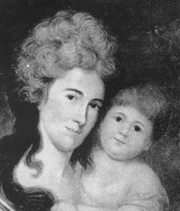
|
| Margaret Oswald Chew Howard |
When the decision was finally made to abandon Philadelphia, six of the British officers personally contributed twenty-five thousand dollars to throwing Philadelphia's most famous, most splendiferous party, called The Machianza. It went on for days, had real jousting matches between officers dressed like knights in armor, banquets and all that sort of thing. It was Andre's idea, and he was enthusiastically in charge. Surviving records of the event do not show that Peggy Shippen was present, but in view of what happened later, much of her correspondence has been destroyed. It's pretty hard to imagine she wasn't there.
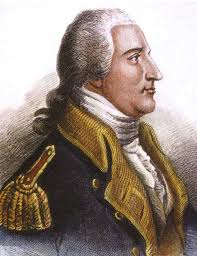
|
| Major General Benedict Arnold |
The British then marched away, and Washington's troops cautiously followed, assuming control of the city. Major General Benedict Arnold had been sent from Saratoga to Valley Forge to recover from his leg wound, and probably also to raise morale among the troops celebrating the now-famous hero. Washington more or less immediately decided to pursue the British across New Jersey, thus leading to the battle of Monmouth as the two armies raced for the Naval vessels in lower New York harbor. Since General Arnold had not fully recovered from his wounds, he was installed as the military governor of a somewhat bedraggled Philadelphia. Naturally, he was the center of the social scene, and soon was pursuing Peggy Shippen in every way he knew, which included some pretty gloppy letters in Romantic style. Peggy's father was uneasy about his intentions but was eventually mollified by Arnold's purchase of the house called Mount Pleasant, now a tourist attraction in Fairmount Park. With this evidence that his prospective son in law was at least likely to stay in Philadelphia, Edward Shippen finally repented of his opposition to the marriage of his daughter. But the new couple were soon off to West Point, where Arnold had kept up a persuasion campaign with George Washington, to get himself appointed the commandant of the main northern defense of the Hudson River. A point for Philadelphian tour guides to remember is that Peggy and Benedict never got a chance to live in Mount Pleasant.
Arnold originally lived in New Haven, Connecticut, where he had established quite a sea-faring reputation as a merchant, some would say privateer, others would say buccaneer. There is no doubt he was aggressive, and combative, and considered himself a little bit above the law. These qualities made him outstanding at Fort Ticonderoga and Saratoga, and are always more highly valued in young men in a war. Unfortunately, he made a bitter enemy of Joseph Read who was briefly his neighbor, and later was President of the Continental Congress. Read accused Arnold of smuggling and trading with the enemy, and was so determined about it that Arnold was scheduled for court-martial, but postponed. Arnold was loudly defensive about the whole matter, and public sympathy was on his side. In view of what soon happened, he might well have been cleared by the court, but likely there was some truth to the accusations. Using Peggy as a go-between, he entered into a correspondence with Andre (then the adjutant-general in New York) offering to deliver the surrender of West Point, three thousand prisoners, and possibly George Washington himself in return for what might today be half a million dollars. As a note of realism, he was willing to accept half that in the event of failure. The British were particularly anxious to acquire American prisoners to exchange for their own troops captured at Saratoga. Unless Arnold was a total sociopath, he must have thought he had quite a grievance.
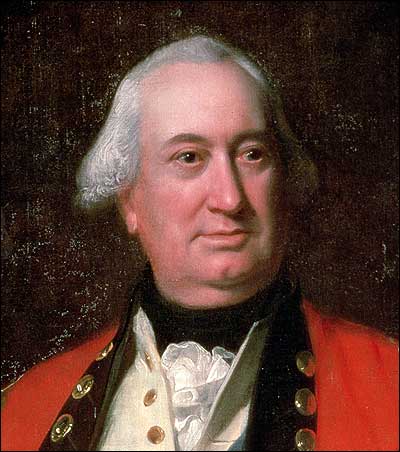
|
| Lord Cornwallis |
Things went along surprisingly well at first, with negotiations for price back and forth, plans for attacking West Point moving along with the Navy, and Andre disguising himself for a visit to Arnold in his house to the south of the Fort on West Point. Much of the success was due to the movie-star reputation of Benedict Arnold; few could imagine such a hero doing such an unheard-of thing. However, the plot was discovered while Washington was away visiting the Fort, and Arnold hastily abandoned his family and fled to a waiting British warship. Andre decided to make his way south to the ship through rebel territory, but local soldiers and farmers were much more suspicious than others had been, and after penetrating his disguise, found incriminating papers concealed in his boots. Since he was out of uniform behind enemy lines, Andre was by definition a spy, which required hanging. He made a plea to be shot like a gentleman, but Washington with tears allegedly in his eyes refused. With much bravado, Andre jumped atop his own casket and placed the noose around his own neck, a behavior much admired by his compatriots when they heard of it
Meanwhile, Peggy had put on a crazy-woman act which apparently convinced Washington to be lenient, and allow her to rejoin her husband. The couple stayed in New York for a few months, toying with commands of loyalist troops in the south, but eventually taking ship for England. Lord Cornwallis was on the same ship and they became pals as shipmates, pleasing Arnold quite a lot. Unfortunately, British society was only stiffly polite to them, and many did not trouble to conceal their disdain for traitors to any cause, and thus life in England was not smooth. By that time, it is possible that many had begun to suspect the whole idea of treason was Peggy's idea from the start, as is today the conventional view of it. As an American aristocrat, she was uncomfortable with the rebels in Philadelphia, and as the impetuous wife of an accused smuggler, it was difficult to fit in with either the Quakers or the merchants with loyalist leanings. No doubt she heard some catty whisperings among her friends and relatives about her other romantic associations. The British paid them their promised pensions, but a career in the British Army was out of the question for her husband. But the real shock would come, from discovering the British as a whole didn't much care for their behavior, either.
Originally published: Thursday, January 10, 2013; most-recently modified: Friday, May 31, 2019
| Posted by: Mel | Nov 13, 2017 10:01 PM |